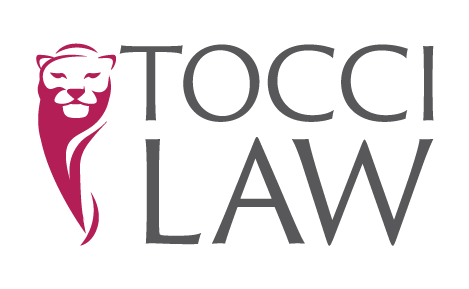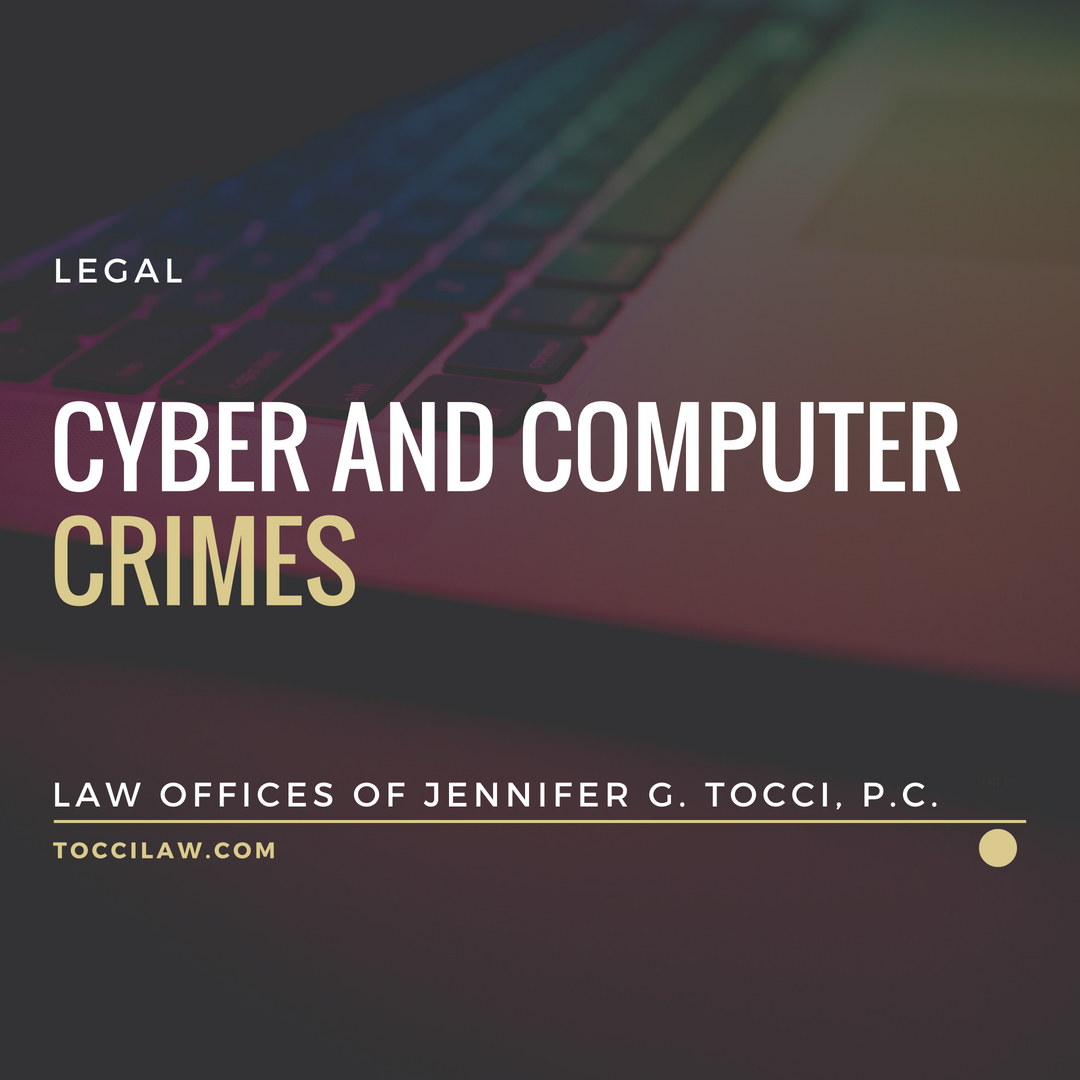With growing participation on social media and nearly unlimited access to the Internet, cyber, and computer crimes are on the rise. Computer, cyber and Internet crimes may be entirely new crimes or just new methods of committing previously established crimes. Cyber and computer crimes include hacking, introducing computer viruses, interfering with others ability to access computers or the Internet, stealing information from a computer or database, improperly accessing a computer, system, or network. We’re frequently hearing about data breaches on the news. (Remember the Google, IRS, and Target data breaches?) The newsworthy data breach stories are usually large scale, but the New York State and Federal cyber and computer crimes apply to one-time and multiple events and single devices as well as several devices.
For Internet, cyber, and computer crimes, you may be charged under New York State law and/or under Federal law. This means you could wind up defending yourself in State Court or Federal Court. Depending on the allegations, you may be charged with multiple crimes for the same or similar act(s) when it comes to using a computer and the Internet, such as Fraud, Identity Theft, False Personation, Larceny, Bullying, etc. You may be charged separately for the criminal activity in addition to the computer and/or cyber crimes. This blog mostly touches on the crimes unique to the Internet and computers.
You may believe you’re acting anonymously via your desktop, laptop, cell phone, and tablet; however, criminal activity can be traced back to your Internet Protocol Address (IP Address). [Sidebar: Cyber crimes may be committed remotely from your computer. A hacker committing the crime will result in a complete defense to the crime if you had no participation in criminal activity.]
It is important to contact an attorney as soon as you are under investigation or suspect you may be charged in an Internet, cyber, or computer crime because an attorney can ensure your right to privacy is protected when it comes to searching your hard drive and other property. Additionally, having your attorney represent before you are charged makes it more likely that you could avoid a possible felony and misdemeanor prosecution, a criminal record and potentially have the case disposed of prior to arrest.
New York Cyber Crimes
Under New York State law, there are five cybercrime offense categories:
- Unauthorized Use of a Computer (NYPL § 156.05)
- Computer Trespass (NYPL § 156.10)
- Computer Tampering [four degrees] (NYPL §§ 156.20-156.27)
- Duplication of Computer-Related Materials (NYPL §§ 156.29-30)
- Possession of Computer-Related Materials (NYPL § 156.35)
Unauthorized Use of a Computer:
According to the Statute, you are guilty of Unauthorized Use of a Computer when you knowingly use, cause to be used, or access a computer, computer service, or computer network without authorization.
Unauthorized Use of a Computer is a Class A Misdemeanor. If convicted of the New York State Crime, you face a sentence up to a year in prison and a fine up to $1,000. Additionally, you may have to relinquish a DNA sample for the DNA databank, as well as pay the DNA databank fees.
Computer Trespass:
The statute states that you are guilty of Computer Trespass when you knowingly use, cause to be used, or access a computer, computer service, or computer network without authorization and (1) do so with an intent to commit or attempt to commit or further the commission of any felony; and/or (2) you knowingly gains access to computer material.
This crime is a Class E Felony. A conviction accompanies a sentence of one to four years in jail, plus a $0-$5,000 fine.
Computer Tampering in the Fourth Degree (§156.20):
You are guilty of Computer Tampering in the Fourth Degree when you use, cause to be used, or access a computer, computer service, or computer network without authorization and you intentionally alter in any manner or destroy computer data or a computer program of another person.
This is a Class A Misdemeanor. If convicted, you will receive a sentence of up to a year in jail and up to $1,000 fine. In addition, you may have to relinquish a DNA sample for the DNA databank, as well as pay the DNA databank fees.
Computer Tampering in the Third Degree (§156.25):
You are guilty of Computer Tampering in the Third Degree when you commit the crime of Computer Tampering in the Fourth Degree (see above) and:
- you do so with an intent to commit or attempt to commit or further the commission of any felony; or
- you have been previously convicted of a computer crime or computer theft crime; or
- you intentionally alter in any manner or destroy computer material; or
- you intentionally alter in any manner or destroy computer data or a computer program causing damages that add up to an amount of over $1,000.
Computer Tampering in the Third Degree is a Class E Felony, accompanying a jail sentence of 1 to 4 years in jail and up to a $5,000 fine.
Computer Tampering in the Second Degree (§156.26):
You are guilty of Computer Tampering in the Second Degree when you commit the crime of Computer Tampering in the Fourth Degree and you intentionally alter in any manner or destroy:
- computer data or a computer program causing damages that add up to more than $3,000; or
- computer material that contains records of the medical history or medical treatment of an identified individual causing, or allowing for the cause of suffering a serious physical injury to that/those person(s).
Computer Tampering in the Second Degree is a Class D Felony. If convicted, you face a sentence of between 1 and 7 years in jail and a fine of up to $5,000.
Computer Tampering in the First Degree (§156.27):
You are guilty of Computer Tampering in the First Degree when you commit the crime of Computer Tampering in the Fourth Degree and he intentionally alters in any manner or destroys computer data or a computer program so as to cause damages in an aggregate amount exceeding fifty thousand dollars.
This is a Class C Felony. If convicted of Computer Tampering in the First Degree, the sentence is 1 to 15 years in jail and a $5,000 fine.
Unlawful Duplication of Computer-Related Material in the Second Degree (§156.29):
You are guilty of Unlawful Duplication of Computer-Related Material in the Second Degree when having no right to do so, you copy, reproduce or duplicate in any manner computer material that contains records of the medical history or treatment of an individual or individuals with an intent to commit or further the commission of any computer crime.
This is a Class B Misdemeanor. If you’re convicted of this crime, you face up to 3 months in jail and up to a $500 fine.
Unlawful Duplication of Computer-Related Material in the First Degree (§156.30):
You are guilty of Unlawful Duplication of Computer-Related Materials in the First Degree when having no right to do so, you copy, reproduce or duplicate in any manner:
- any computer data or computer program and intentionally and wrongfully deprive or appropriate from an owner an economic value or benefit of over $2,500; or
- any computer data or computer program with an intent to commit or attempt to commit or further the commission of any felony.
If you are convicted of this Class E Felony, you face between one and four years in jail and a $5,000 fine.
Possession of Computer-Related Materials:
You are guilty of Criminal Possession of Computer-Related Material when having no right to do so, you knowingly possess, in any form, any copy, reproduction or duplicate of any computer data or computer program which was copied, reproduced or duplicated in violation Unlawful Duplication of Computer Related Material in the First Degree (see above), with intent to benefit yourself or a person other than an owner.
If you are convicted of this Class E Felony, you face between one and four years in jail and a $5,000 fine.
Cyber Harassment:
The crime of Cyber Harassment, or Aggravated Harassment in the Second Degree, has been determined unconstitutional by the New York Court of Appeals for being vague and overbroad. See, People v. Golb. The statute states that it is illegal to communicate, anonymously or otherwise, by telephone, computer, or any other electronic means, or by mail, or by transmitting or delivering any other form of communication, a threat to cause physical harm to, or unlawful harm to the property of, such person, or a member of such person’s same family or household. This does not mean that you’re free to harass and annoy people via the Internet. The Court of Appeals quoted in its decision rational from another case, People v Dietze that “any prescription of pure speech must be sharply limited to words which, by their utterance alone, inflict injury or tend naturally to evoke immediate violence.” Harassing and threatening words could still inflict injury and evoke immediate violence. Additionally, while you cannot be convicted of this specific statute, Cyber Harassment could still land you charged with other types of charges, as well as result in orders of protection being issued against you. If your conduct in “real life” could cause you to be charged with a crime, such as a hate crime, or harassment, just because your conduct was committed via the Internet does not prevent you from being charged.
New York Internet Sex Crimes
In addition to the already established sex crimes, a person engaging in online sex can be charged with cyber-based crimes including:
- Disseminating indecent material to a minor;
- Promoting an obscene sexual performance by a child;
- Possessing an obscene sexual performance by a child;
- Promoting a sexual performance by a child; and
- Possessing a sexual performance by a child.
Defenses to Internet and Computer Crimes (§156.50):
In addition to the regular defenses that are available to defend crimes, computer-specific defenses include:
- Reasonable belief that you had authorization to use the computer;
- Reasonable belief that you had authorization to alter or destroy a computer data or computer program;
- Reasonable belief that you had right to copy, reproduce or duplicate computer data or computer program.
These defenses could be a complete defense (relieving you of liability of the entire charge) or as a partial defense (lowering the charge for which you could be found guilty).
United States Federal Cyber Crimes
Because the Internet frequently crosses state lines, Internet and Computer crimes could land you facing federal charges. A strong defense can help minimize or eliminate the possible fines, penalties and jail time accompanying your charges, whether you’re defending yourself in state court or federal court.
There are many different kinds of computer and Internet-based crimes, which can result in significant fines and even jail time. The federal statutes cover offenses that involve:
- mail fraud;
- wire fraud;
- computer fraud;
- access devices fraud;
- internet fraud;
- injury or destruction to communication lines, stations, or systems;
- illegal interception of wire, oral or electronic communications;
- illegal manufacture, distribution, possession and advertising of illegal devices for the interception of wire, oral or electronic communications;
- unlawful access to stored communications;
- illegal installation or use of a pen register device;
- criminal copyright infringement;
- website forgery;
- filter evasion;
- link manipulation;
- trafficking in counterfeit goods or services;
- computer hacking;
- trafficking in counterfeit labels;
- trafficking in recordings of live musical performances;
- launching spam email attacks;
- identity theft;
- credit card fraud;
- unlawful possession or use of access devices;
- phishing (see the below definition);
- sale of counterfeit goods over the Internet;
- software piracy;
- computer game piracy;
- video game piracy;
- music piracy;
- internet pornography;
- possession of child pornography;
- use of the Internet to disseminate child pornography;
- instant messaging sexually explicit material to children;
- online child sex solicitation;
- cyberstalking;
- crimes against computer and Internet users;
- hacking and computer sabotage;
- internet gambling;
- cyberterrorism.
Unlawful Internet Gambling Enforcement Act:
There are no New York State Laws prohibiting Internet gambling. Therefore, crimes involving Internet gambling are likely going to fall under the Internet Gambling Enforcement Act, landing you in federal court. The law prohibits gaming businesses from knowingly accepting payments in connection with unlawful Internet gambling.
Controlling the Assault of Non-Solicited Pornography And Marketing (CAN-SPAM) Act of 2003:
The CAN-SPAM law was designed to stop marketers from using fraudulent or misleading representation to hook customers and to discourage senders from appropriating email addresses from sources that are not their property, such as Internet Server Provider email directories.
Under this Federal Act, it is illegal to:
- use a hijacked computer to send multiple spam emails;
- send multiple emails using IP addresses that the sender represents falsely as being his/her property;
- disguise the source of the emails by routing them through other computers to deceive their recipients as to their origin;
- send out communications via multiple mailings with falsified information in the header
- distribute multiple emails through various email accounts obtained using falsified account registration information.
Phishing:
Phishing, a type of identity theft, is defined as the fraudulent practice of sending emails purporting to be from reputable companies in order to induce individuals to reveal personal information, such as passwords and credit card numbers. While there is no Federal statute that expressly bans phishing by name, it is prohibited by CAN-SPAM and other fraud and identity theft laws, see, 18 U.S.C. § 1028.
If you’ve been charged with a computer, cyber, or Internet crime, call a skilled attorney who is admitted to practice in both New York State Courts and the Eastern District of New York (Federal Court). The Law Offices of Jennifer G. Tocci, P.C. can represent you in both state and federal court.
Attorney Advertising. This blog post is designed for general information only. The information presented at this site should not be construed to be neither formal legal advice nor the formation of a lawyer-client relationship. Prior results do not guarantee a similar outcome. New York State only.










